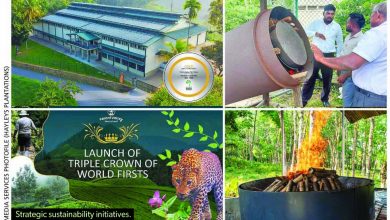YOUTH FORUM
Compiled by Nicola Jayasundera
SWIMMING AGAINST THE TIDE
Muhammad Fidhyan dives into the importance of sports in bridging divides
Q: What’s the good, the bad and the ugly in Sri Lanka?
A: As a young athlete representing Sri Lanka, I have witnessed both the good and the bad in our country. The good lies in our people – their kindness, resilience and passion. Our country has immense potential in sports, education and innovation. Despite the challenges we face, we’ve produced great athletes, scholars and entrepreneurs.
However, the bad side is the economic struggles and lack of support for young talent. Many athletes find it difficult to pursue their dreams due to financial constraints.
The ugly side is the corruption and instability that hinders progress. If our leaders focussed on genuine development rather than personal gains, Sri Lanka could reach new heights.
Q: And what are the challenges facing the nation today?
A: One of the main challenges I see is the lack of opportunities for youth. Many talented individuals either leave the country or give up on their dreams due to financial struggles. As an athlete, I understand how difficult it is to receive proper support, training and sponsorships.
Additionally, the rising cost of living, unemployment and environmental degradation are concerns that impact us all. If we fail to take action now, the future will only become more challenging.
 Q: Do you believe that Sri Lanka will be united one day – and if so, why?
Q: Do you believe that Sri Lanka will be united one day – and if so, why?
A: I believe unity is possible. As a swimmer, I have competed alongside teammates from different ethnic and religious backgrounds. In the water, none of that matters as we all share one goal – to represent Sri Lanka.
If sports can bring people together, I believe the same can happen in other aspects of life. It will take time but if we focus on respect and understanding, we can build a more united country.
Q: Where do you see yourself in 10 years?
A: In 10 years, I see myself as a professional athlete representing Sri Lanka on the international stage. I want to make a name for myself in swimming by winning Olympic gold medals and bringing pride to my country.
At the same time, I aim to use my experience to inspire young athletes and help create a better sports culture in Sri Lanka. I also envision myself as an entrepreneur, using business as a means to support my career and give back to the community.
Q: And where do you see Sri Lanka in a decade from today?
A: I hope to see a country that provides better opportunities for young people. If the right decisions are made, we can build a country where athletes, students and entrepreneurs don’t have to struggle for support.
And I hope that Sri Lanka develops its sports sector, giving more athletes a chance to compete at the highest level.
Q: Who is responsible for climate change and global warming – and what must be done about it?
A: While big industries have contributed the most to climate change, I believe we all have a role to play. Deforestation, pollution and plastic waste are major issues in Sri Lanka.
As young people, we need to take responsibility by making sustainable choices and spreading awareness. Small actions such as reducing waste and planting trees can make a big difference if we work together.
Q: How do you view the growing importance of social media today?
A: Social media has changed the way we connect, learn and promote ourselves. As an athlete, I see it as a tool to inspire others, showcase my journey and build a brand. It also creates business opportunities, enabling young entrepreneurs to grow without needing huge investments.
However, social media has its negatives too – such as misinformation and cyberbullying – so we must use it wisely.
Q: And where do you see the world in 10 years’ time?
A: The world is evolving rapidly with advancements in technology, AI and sports science. In 10 years, training methods for athletes will likely be more advanced, offering better ways to enhance performance.
However, global conflicts and climate change pose major threats. If we don’t work towards peace and sustainability, the future may not be as bright as we hope.








